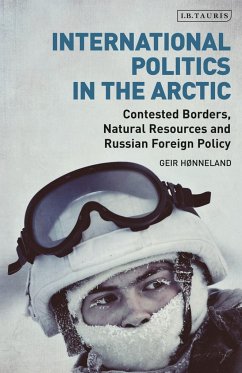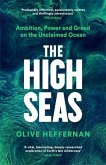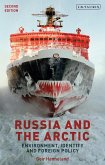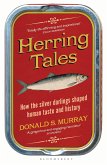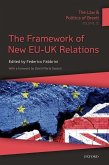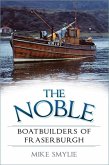Geir Honneland (Norway Fridtjof Nansen Institute)
International Politics in the Arctic
Contested Borders, Natural Resources and Russian Foreign Policy
Schade – dieser Artikel ist leider ausverkauft. Sobald wir wissen, ob und wann der Artikel wieder verfügbar ist, informieren wir Sie an dieser Stelle.
Geir Honneland (Norway Fridtjof Nansen Institute)
International Politics in the Arctic
Contested Borders, Natural Resources and Russian Foreign Policy
- Broschiertes Buch
- Merkliste
- Auf die Merkliste
- Bewerten Bewerten
- Teilen
- Produkt teilen
- Produkterinnerung
- Produkterinnerung
As the ice around the Arctic landmass recedes, the territory is becoming a flashpoint in world affairs. New trade routes, cutting thousands of miles off journeys, are available, and the Arctic is thought to be home to enormous gas and oil reserves. The territorial lines are new and hazy. This book looks at how Russia deals with the outside world vis a vis the Arctic. Given Russia's recent bold foreign policy interventions, these are crucial issues and the realpolitik practiced by the Russian state is essential for understanding the Arctic's future.Here, Geir Honneland brings together decades…mehr
Andere Kunden interessierten sich auch für
![The High Seas The High Seas]() Olive HeffernanThe High Seas17,99 €
Olive HeffernanThe High Seas17,99 €![Russia and the Arctic Russia and the Arctic]() Geir HÃ nneland (Norway Fridtjof Nansen Institute)Russia and the Arctic34,99 €
Geir HÃ nneland (Norway Fridtjof Nansen Institute)Russia and the Arctic34,99 €![Scottish Arctic Whaling Scottish Arctic Whaling]() Chesley W. SangerScottish Arctic Whaling29,99 €
Chesley W. SangerScottish Arctic Whaling29,99 €![Herring Tales Herring Tales]() Donald S. MurrayHerring Tales12,99 €
Donald S. MurrayHerring Tales12,99 €![The Gods of the Sea The Gods of the Sea]() Fynn Holm (Germany Eberhard-Karls-Universitat Tubingen)The Gods of the Sea110,99 €
Fynn Holm (Germany Eberhard-Karls-Universitat Tubingen)The Gods of the Sea110,99 €![The Law & Politics of Brexit: Volume III The Law & Politics of Brexit: Volume III]() The Law & Politics of Brexit: Volume III51,99 €
The Law & Politics of Brexit: Volume III51,99 €![The Noble Boatbuilders of Fraserburgh The Noble Boatbuilders of Fraserburgh]() Mike SmylieThe Noble Boatbuilders of Fraserburgh27,99 €
Mike SmylieThe Noble Boatbuilders of Fraserburgh27,99 €-
-
-
As the ice around the Arctic landmass recedes, the territory is becoming a flashpoint in world affairs. New trade routes, cutting thousands of miles off journeys, are available, and the Arctic is thought to be home to enormous gas and oil reserves. The territorial lines are new and hazy. This book looks at how Russia deals with the outside world vis a vis the Arctic. Given Russia's recent bold foreign policy interventions, these are crucial issues and the realpolitik practiced by the Russian state is essential for understanding the Arctic's future.Here, Geir Honneland brings together decades of cutting-edge research - investigating the political contexts and international tensions surrounding Russia's actions. Honneland looks specifically at 'region-building' and environmental politics of fishing and climate change, on nuclear safety and nature preservation, and also analyses the diplomatic relations surrounding clashes with Norway and Canada, as well as at the governance of the Barents Sea. The Politics of the Arctic is a crucial addition to our understanding of contemporary International Relations concerning the Polar North.
Produktdetails
- Produktdetails
- Library of Arctic Studies
- Verlag: Bloomsbury Publishing PLC
- Seitenzahl: 416
- Erscheinungstermin: 26. Dezember 2019
- Englisch
- Abmessung: 139mm x 216mm x 29mm
- Gewicht: 520g
- ISBN-13: 9780755601110
- ISBN-10: 0755601114
- Artikelnr.: 58411276
- Herstellerkennzeichnung
- Libri GmbH
- Europaallee 1
- 36244 Bad Hersfeld
- gpsr@libri.de
- Library of Arctic Studies
- Verlag: Bloomsbury Publishing PLC
- Seitenzahl: 416
- Erscheinungstermin: 26. Dezember 2019
- Englisch
- Abmessung: 139mm x 216mm x 29mm
- Gewicht: 520g
- ISBN-13: 9780755601110
- ISBN-10: 0755601114
- Artikelnr.: 58411276
- Herstellerkennzeichnung
- Libri GmbH
- Europaallee 1
- 36244 Bad Hersfeld
- gpsr@libri.de
Geir Hønneland is Research Director at the Fridtjof Nansen Institute, and Adjunct Professor of Political Science at the Arctic University in Tromso, Norway.
Part I Background Introduction 1. Identity Formation in the Barents
Euro-Arctic Region Introduction: The Creation of the Barents Region The
Region-building Approach Self and Other in Identity Formation Alleged
We-hood: The Return from a Historical Parenthesis The Fragility of We-hood
'The Cultural Counter-argument' 'The Identity of Contrasts' Conclusion Part
II Environmental Discourse in the European Arctic 2. Fish Discourse:
Norway, Russia and the Northeast Arctic Cod Introduction The Concept of
Discourse Analysis 28 The Study of Environmental Discourse 30 Scientific
Recommendations and Established Quotas Since 1990 33 Defining Major
Discourses 34 Conclusion 45 3. East Meets West: Deliberations on the
Environment 48 Introduction 48 The Study of Environmental Discourse 49
Environmental Issues in the European Arctic 51 Defining Major Discourses 53
Brokering Scientific Knowledge 63 Storylines and Metaphors 65 Embeddedness
and Discourse Classification 66 Conclusion 69 Part III Implementing
International Environmental Agreements in the Russian North 4. From Air
Pollution Control to Nuclear Safety: Why Implement? 75 Introduction 75
Implementation: The 'What's, 'Why's and 'How's 76 What's the Problem? 80
What's to be Implemented? 83 Implementation Performance and Target
Compliance 86 Implementation Activities 87 Discussion 93 Conclusion 99 5.
Implementing Global Nature Protection Agreements 102 Introduction 102 The
Global Nature Protection Regimes 104 Implementation of the Agreements in
Russia 106 Domestic Implementation Activities 113 Conclusion 122 Part IV
Combating Communicable Diseases in Northwest Russia 6. Western vs
Post-Soviet Medicine: Donors and Dilettantes 127 Introduction 127 DOTS in
Russia and the Baltic states 129 General Receptiveness to Western Ideas 139
Conclusion 146 vi INTERNATIONAL POLITICS IN THE ARCTIC 7. Patriots, Doctors
and Happy Soviets 149 Introduction 149 Interpreting Qualitative Interviews
150 Health Initiatives from the West 152 The Interview Scene: 'Cast' and
Interpretation 153 Part V Russians in the Borderlands 8. How to be a
Northerner 165 Borderlands, Identity, Narrative 165 Interview 1: 'When I
told them how I lived, they went all misty-eyed' 169 Interview 2: 'If you'd
asked me last year, I would have said Murmansk was the best place in the
world' 172 Interview 3: 'The north is like a bottomless pit dragging you
down' 174 Negotiating Stereotypes about North and South 176 The Vocabulary
Available - Identity as Narrative 181 Changing Borders? 185 Conclusions 187
9. How to be a Russian 190 Introduction 190 Interview 1: 'Their eyes are
always wide open' 190 Interview 2: 'As nations, they're on the decline' 191
Interview 3: 'Everything over there predisposes them to equanimity' 192
Exploring Stereotypes about Scandinavians 193 The Words to Say It -
Identity as Narrative 201 New Borderlands? 204 Narrative Juggling 209 Part
VI Post-Agreement Bargaining in the Barents Sea 10. Making Russia Comply:
Bargaining Precautionary Fisheries Management in the Barents Sea 215
Introduction 215 Approaches to State Compliance with International Treaties
217 Post-agreement Bargaining 219 CONTENTS vii The Norwegian - Russian
Fisheries Management Regime in the Barents Sea 222 Norwegian - Russian
Bargaining Experiences 225 Why does Russia Comply? 229 Post-agreement
Bargaining Revisited 235 11. Fishing Field Deliberations 237 An Observer's
Account 238 Russian Fishers' Accounts in the late 1990s 246 Russian
Fishers' Accounts Ten Years Later 250 Bargaining Dynamics 254 Bargaining
Results 258 Post-agreement Bargaining Revisited 262 Part VII Arctic Talk,
Russian Politics 12. 'The Global Fight against Canada in the Arctic' 267
Identity and Foreign Policy 267 All the Way to the Pole 270 'The Global
Fight' 274 'The Arctic is our Everything' 281 Our Ocean, Our Future, Our
Foes 285 13. 'They'll Squeeze us Out, it'
Euro-Arctic Region Introduction: The Creation of the Barents Region The
Region-building Approach Self and Other in Identity Formation Alleged
We-hood: The Return from a Historical Parenthesis The Fragility of We-hood
'The Cultural Counter-argument' 'The Identity of Contrasts' Conclusion Part
II Environmental Discourse in the European Arctic 2. Fish Discourse:
Norway, Russia and the Northeast Arctic Cod Introduction The Concept of
Discourse Analysis 28 The Study of Environmental Discourse 30 Scientific
Recommendations and Established Quotas Since 1990 33 Defining Major
Discourses 34 Conclusion 45 3. East Meets West: Deliberations on the
Environment 48 Introduction 48 The Study of Environmental Discourse 49
Environmental Issues in the European Arctic 51 Defining Major Discourses 53
Brokering Scientific Knowledge 63 Storylines and Metaphors 65 Embeddedness
and Discourse Classification 66 Conclusion 69 Part III Implementing
International Environmental Agreements in the Russian North 4. From Air
Pollution Control to Nuclear Safety: Why Implement? 75 Introduction 75
Implementation: The 'What's, 'Why's and 'How's 76 What's the Problem? 80
What's to be Implemented? 83 Implementation Performance and Target
Compliance 86 Implementation Activities 87 Discussion 93 Conclusion 99 5.
Implementing Global Nature Protection Agreements 102 Introduction 102 The
Global Nature Protection Regimes 104 Implementation of the Agreements in
Russia 106 Domestic Implementation Activities 113 Conclusion 122 Part IV
Combating Communicable Diseases in Northwest Russia 6. Western vs
Post-Soviet Medicine: Donors and Dilettantes 127 Introduction 127 DOTS in
Russia and the Baltic states 129 General Receptiveness to Western Ideas 139
Conclusion 146 vi INTERNATIONAL POLITICS IN THE ARCTIC 7. Patriots, Doctors
and Happy Soviets 149 Introduction 149 Interpreting Qualitative Interviews
150 Health Initiatives from the West 152 The Interview Scene: 'Cast' and
Interpretation 153 Part V Russians in the Borderlands 8. How to be a
Northerner 165 Borderlands, Identity, Narrative 165 Interview 1: 'When I
told them how I lived, they went all misty-eyed' 169 Interview 2: 'If you'd
asked me last year, I would have said Murmansk was the best place in the
world' 172 Interview 3: 'The north is like a bottomless pit dragging you
down' 174 Negotiating Stereotypes about North and South 176 The Vocabulary
Available - Identity as Narrative 181 Changing Borders? 185 Conclusions 187
9. How to be a Russian 190 Introduction 190 Interview 1: 'Their eyes are
always wide open' 190 Interview 2: 'As nations, they're on the decline' 191
Interview 3: 'Everything over there predisposes them to equanimity' 192
Exploring Stereotypes about Scandinavians 193 The Words to Say It -
Identity as Narrative 201 New Borderlands? 204 Narrative Juggling 209 Part
VI Post-Agreement Bargaining in the Barents Sea 10. Making Russia Comply:
Bargaining Precautionary Fisheries Management in the Barents Sea 215
Introduction 215 Approaches to State Compliance with International Treaties
217 Post-agreement Bargaining 219 CONTENTS vii The Norwegian - Russian
Fisheries Management Regime in the Barents Sea 222 Norwegian - Russian
Bargaining Experiences 225 Why does Russia Comply? 229 Post-agreement
Bargaining Revisited 235 11. Fishing Field Deliberations 237 An Observer's
Account 238 Russian Fishers' Accounts in the late 1990s 246 Russian
Fishers' Accounts Ten Years Later 250 Bargaining Dynamics 254 Bargaining
Results 258 Post-agreement Bargaining Revisited 262 Part VII Arctic Talk,
Russian Politics 12. 'The Global Fight against Canada in the Arctic' 267
Identity and Foreign Policy 267 All the Way to the Pole 270 'The Global
Fight' 274 'The Arctic is our Everything' 281 Our Ocean, Our Future, Our
Foes 285 13. 'They'll Squeeze us Out, it'
Part I Background Introduction 1. Identity Formation in the Barents
Euro-Arctic Region Introduction: The Creation of the Barents Region The
Region-building Approach Self and Other in Identity Formation Alleged
We-hood: The Return from a Historical Parenthesis The Fragility of We-hood
'The Cultural Counter-argument' 'The Identity of Contrasts' Conclusion Part
II Environmental Discourse in the European Arctic 2. Fish Discourse:
Norway, Russia and the Northeast Arctic Cod Introduction The Concept of
Discourse Analysis 28 The Study of Environmental Discourse 30 Scientific
Recommendations and Established Quotas Since 1990 33 Defining Major
Discourses 34 Conclusion 45 3. East Meets West: Deliberations on the
Environment 48 Introduction 48 The Study of Environmental Discourse 49
Environmental Issues in the European Arctic 51 Defining Major Discourses 53
Brokering Scientific Knowledge 63 Storylines and Metaphors 65 Embeddedness
and Discourse Classification 66 Conclusion 69 Part III Implementing
International Environmental Agreements in the Russian North 4. From Air
Pollution Control to Nuclear Safety: Why Implement? 75 Introduction 75
Implementation: The 'What's, 'Why's and 'How's 76 What's the Problem? 80
What's to be Implemented? 83 Implementation Performance and Target
Compliance 86 Implementation Activities 87 Discussion 93 Conclusion 99 5.
Implementing Global Nature Protection Agreements 102 Introduction 102 The
Global Nature Protection Regimes 104 Implementation of the Agreements in
Russia 106 Domestic Implementation Activities 113 Conclusion 122 Part IV
Combating Communicable Diseases in Northwest Russia 6. Western vs
Post-Soviet Medicine: Donors and Dilettantes 127 Introduction 127 DOTS in
Russia and the Baltic states 129 General Receptiveness to Western Ideas 139
Conclusion 146 vi INTERNATIONAL POLITICS IN THE ARCTIC 7. Patriots, Doctors
and Happy Soviets 149 Introduction 149 Interpreting Qualitative Interviews
150 Health Initiatives from the West 152 The Interview Scene: 'Cast' and
Interpretation 153 Part V Russians in the Borderlands 8. How to be a
Northerner 165 Borderlands, Identity, Narrative 165 Interview 1: 'When I
told them how I lived, they went all misty-eyed' 169 Interview 2: 'If you'd
asked me last year, I would have said Murmansk was the best place in the
world' 172 Interview 3: 'The north is like a bottomless pit dragging you
down' 174 Negotiating Stereotypes about North and South 176 The Vocabulary
Available - Identity as Narrative 181 Changing Borders? 185 Conclusions 187
9. How to be a Russian 190 Introduction 190 Interview 1: 'Their eyes are
always wide open' 190 Interview 2: 'As nations, they're on the decline' 191
Interview 3: 'Everything over there predisposes them to equanimity' 192
Exploring Stereotypes about Scandinavians 193 The Words to Say It -
Identity as Narrative 201 New Borderlands? 204 Narrative Juggling 209 Part
VI Post-Agreement Bargaining in the Barents Sea 10. Making Russia Comply:
Bargaining Precautionary Fisheries Management in the Barents Sea 215
Introduction 215 Approaches to State Compliance with International Treaties
217 Post-agreement Bargaining 219 CONTENTS vii The Norwegian - Russian
Fisheries Management Regime in the Barents Sea 222 Norwegian - Russian
Bargaining Experiences 225 Why does Russia Comply? 229 Post-agreement
Bargaining Revisited 235 11. Fishing Field Deliberations 237 An Observer's
Account 238 Russian Fishers' Accounts in the late 1990s 246 Russian
Fishers' Accounts Ten Years Later 250 Bargaining Dynamics 254 Bargaining
Results 258 Post-agreement Bargaining Revisited 262 Part VII Arctic Talk,
Russian Politics 12. 'The Global Fight against Canada in the Arctic' 267
Identity and Foreign Policy 267 All the Way to the Pole 270 'The Global
Fight' 274 'The Arctic is our Everything' 281 Our Ocean, Our Future, Our
Foes 285 13. 'They'll Squeeze us Out, it'
Euro-Arctic Region Introduction: The Creation of the Barents Region The
Region-building Approach Self and Other in Identity Formation Alleged
We-hood: The Return from a Historical Parenthesis The Fragility of We-hood
'The Cultural Counter-argument' 'The Identity of Contrasts' Conclusion Part
II Environmental Discourse in the European Arctic 2. Fish Discourse:
Norway, Russia and the Northeast Arctic Cod Introduction The Concept of
Discourse Analysis 28 The Study of Environmental Discourse 30 Scientific
Recommendations and Established Quotas Since 1990 33 Defining Major
Discourses 34 Conclusion 45 3. East Meets West: Deliberations on the
Environment 48 Introduction 48 The Study of Environmental Discourse 49
Environmental Issues in the European Arctic 51 Defining Major Discourses 53
Brokering Scientific Knowledge 63 Storylines and Metaphors 65 Embeddedness
and Discourse Classification 66 Conclusion 69 Part III Implementing
International Environmental Agreements in the Russian North 4. From Air
Pollution Control to Nuclear Safety: Why Implement? 75 Introduction 75
Implementation: The 'What's, 'Why's and 'How's 76 What's the Problem? 80
What's to be Implemented? 83 Implementation Performance and Target
Compliance 86 Implementation Activities 87 Discussion 93 Conclusion 99 5.
Implementing Global Nature Protection Agreements 102 Introduction 102 The
Global Nature Protection Regimes 104 Implementation of the Agreements in
Russia 106 Domestic Implementation Activities 113 Conclusion 122 Part IV
Combating Communicable Diseases in Northwest Russia 6. Western vs
Post-Soviet Medicine: Donors and Dilettantes 127 Introduction 127 DOTS in
Russia and the Baltic states 129 General Receptiveness to Western Ideas 139
Conclusion 146 vi INTERNATIONAL POLITICS IN THE ARCTIC 7. Patriots, Doctors
and Happy Soviets 149 Introduction 149 Interpreting Qualitative Interviews
150 Health Initiatives from the West 152 The Interview Scene: 'Cast' and
Interpretation 153 Part V Russians in the Borderlands 8. How to be a
Northerner 165 Borderlands, Identity, Narrative 165 Interview 1: 'When I
told them how I lived, they went all misty-eyed' 169 Interview 2: 'If you'd
asked me last year, I would have said Murmansk was the best place in the
world' 172 Interview 3: 'The north is like a bottomless pit dragging you
down' 174 Negotiating Stereotypes about North and South 176 The Vocabulary
Available - Identity as Narrative 181 Changing Borders? 185 Conclusions 187
9. How to be a Russian 190 Introduction 190 Interview 1: 'Their eyes are
always wide open' 190 Interview 2: 'As nations, they're on the decline' 191
Interview 3: 'Everything over there predisposes them to equanimity' 192
Exploring Stereotypes about Scandinavians 193 The Words to Say It -
Identity as Narrative 201 New Borderlands? 204 Narrative Juggling 209 Part
VI Post-Agreement Bargaining in the Barents Sea 10. Making Russia Comply:
Bargaining Precautionary Fisheries Management in the Barents Sea 215
Introduction 215 Approaches to State Compliance with International Treaties
217 Post-agreement Bargaining 219 CONTENTS vii The Norwegian - Russian
Fisheries Management Regime in the Barents Sea 222 Norwegian - Russian
Bargaining Experiences 225 Why does Russia Comply? 229 Post-agreement
Bargaining Revisited 235 11. Fishing Field Deliberations 237 An Observer's
Account 238 Russian Fishers' Accounts in the late 1990s 246 Russian
Fishers' Accounts Ten Years Later 250 Bargaining Dynamics 254 Bargaining
Results 258 Post-agreement Bargaining Revisited 262 Part VII Arctic Talk,
Russian Politics 12. 'The Global Fight against Canada in the Arctic' 267
Identity and Foreign Policy 267 All the Way to the Pole 270 'The Global
Fight' 274 'The Arctic is our Everything' 281 Our Ocean, Our Future, Our
Foes 285 13. 'They'll Squeeze us Out, it'

